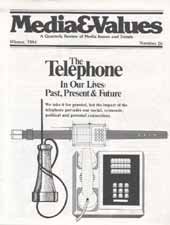Our New Phone Systems: Making Human Connections
|
This article originally appeared in Issue# 26
|
If you're like most people, you're dubious, to say the least, about the possibility of talking to your ORT screen.
But the prospect of interactive computer technology, in which you put information into a system for intelligent processing and two-way communication, shouldn't be so threatening because you've been dealing with an "interactive communications medium" for practically your whole life.
You don't remember that, you say? Well, you started learning how to use it about the time you started to talk. It's called the telephone.
In fact, now that computer and telephone technology have merged (which is what the current fuss is all about; in essence, the government got so tired of trying to decide what was a computer and what was a telephone so it could regulate them that it gave up) the challenge is to extend the telephones capacity for HUMANE, INTERACTIVE people connections.
The intimacy and possibilities for dialogue that the telephone has always encouraged are directly based on its interactivity. It is the opportunity for IMMEDIATE response, not the fact that you can hear a voice on the other end, that is valuable.
With communications/computer technologies changing all around us, one of the most confusing challenges is to deal with the telephone now that it's a computer -- a smart machine that tells itself to call-forward, teleconference and act as an alarm system.
As a recent Time cover story noted, one of the more serious problems will simply be dealing with the acceleration in the pace of technological change, as AT&T's new modus operandi causes a chain reaction that will have a multitude of companies jockeying for position in the newly expanded marketplace.
Because a monolithic company will no longer be providing one- class service, consumers and everyone interested in the implications of communications policy will have to keep monitoring the developing systems.
As people who care about our society and the people in it, we can't allow the poor, the elderly and other groups to be marooned on disconnected islands out of the communications mainstream. If we do, it not only hurts them, but we lose what they have to contribute to the total flow of messages. We can't afford to hang anyone up.
Toffler suggests in The Third Wave that "the link between communications and character is complex, but unbreakable. We cannot transform all our media of communications and expect to remain unchanged as people." It changes in the plain old telephone service will alter us and our society along with our communications patterns.
The seemingly simple system we're so used to, put the world at our fingertips. It also ushered in giant bureaucracies and helped to bring about the impersonality of the modern megalopolis. Nobody expected these results, but they happened. We don't know what our new communications systems will do either, but we do know they will change things.
To make sure these changes are humane, we need to continue to INTERCONNECT, If we stay alert to the possibilities as well as the problems, tomorrow's telephone system could make that easier than ever.



